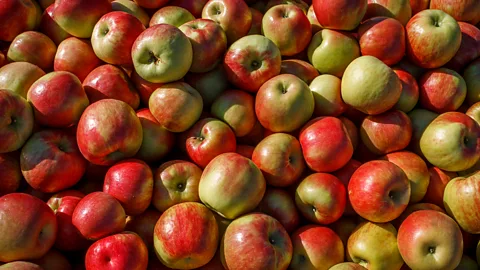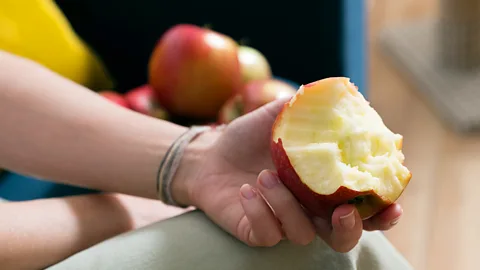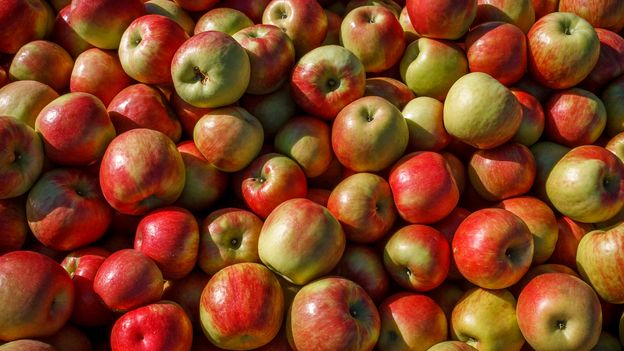

We are told that an apple a day keeps the doctor away, but does this humble fruit really have a positive effect on our health?
The popular expression “one apple a day takes the doctor away” comes from a slightly more virtured Welsh proverb written in 1866: “Eat an apple while going to bed and prevents the doctor from winning his bread.”
But is there a truth at the heart of this longtime maxim? And are apples particularly healthy compared to other fruits?
First of all, let’s think about the nutrients that apples contain. On the one hand, they are a rich source of phytochemicals, including flavanols. These compounds have been linked to many health benefits, such as maintaining healthy weight and reducing your risk of heart disease.
Why are the apples so healthy
These nutrients in apples seem to offer health benefits. A 2017 review of five studies indicated that apple consumption is associated with a reduction of 18% of the risk of developing type 2 diabetes. Another 2022 review, which analyzed 18 studies, revealed that eating more apples or apple derived food such as apple juice, can reduce cholesterolIf you keep the habit for more than a week.


Eating apples regularly seems to be associated with various health benefits – and we know that they are filled with healthy compounds. But are the apples, in particular, more effective than other plants based on plants to keep the doctor away?
“Apples do not have much vitamin C, and they have no iron or calcium, but they have so many other ingredients that promote health and do wonderful things for the body,” said Janet Colson, professor of nutrition and food sciences at the Middle Tennessee State University in the United States.
Apples contain compounds common to many fruits and vegetables, including useful polyphenols, explains Flavia Guzzo, an associate professor of plant biology at the University of Verona in Italy.
Apples also contain polyphenol phloridzine, which is much less common in the other fruits of your fruit bowl. Like pectin, phloridzine seems to reduce the amount of sugar that we absorb food into our blood.
But it is not only powerful polyphenols and antioxidant punch that have led some scientists to recommend apples on other fruits. In several articles, scientists recommend regular apple eaters because the fruits are simply available. This means that eating them regularly is something that is relatively feasible for many people.


It is clear that apples have the potential to improve our health. But it is a great pretension to say that eating one every day will prevent us from having to go to the general practitioner.
Fortunately, a 2015 study addressed this exact issue. The researchers analyzed a survey of nearly 9,000 people, which, the participants, said what they ate during a 24 -hour period, which said they said their typical daily diet.
“The main conclusion, that there is not many associations between people who regularly consume one apple a day and the probability of visiting a doctor, is that it is complex,” said principal researcher Matthew Davis, deputy professor of epidemiology at Dartmouth Geisel School of Medicine in New Hampshire, in the United States.
“People who consume apples, based on our analyzes, are generally healthy.”
But they also found that daily apple eaters were less likely to depend on prescription drugs – and it was always an important observation when adapting socioeconomic differences between participants who ate an apple per day and those who did not do it.
Consequently, the newspaper concludes, a more relevant saying could be: “One apple a day moves the pharmacist away.”
But Davis has problems with apple sentence a day, and says that there can be another reason why he and his colleagues have not found any link between the daily consumption of apple and the fact of the doctor.
“The underlying hypothesis is that you only visit the doctor when you are sick, but people visit the doctor for annual checks and other prevention-type things,” he said. This is why Davis also analyzed data on the probability of also using prescription drugs.
“This implies that apples reduce the probability of having a chronic disease,” he said.


But in the end, he said, the apples alone are not sufficient to prevent you from having to visit the general practitioner, and that the most impactful thing is to have a healthy diet overall. “Which, really, is the saying of saying,” he says.
Colson is suitable that apple sentence a day refers to eating plants regularly based on plants. Apples are a good example because they are so easily available, affordable, have a long shelf life.
“Before the refrigerators, you can put apples in the cellar and they would last a long time, and they do not attract mold,” she said.
Other studies have revealed health benefits relating to daily apple eaters – but only when people consume more than one per day.
In a study published in 2020, the researchers divided 40 participants (who all had a slightly high cholesterol level) in two groups. One of these groups ate two apples a day while the other drank an apple drink with similar calories. The experience lasted eight weeks and, apart from Apple products, the participants did not make any other change to their diet. Researchers discovered that Apple eaters had a clinically significant level of cholesterolat the end of the study. However, a weakness of this study its small size; 40 participants is a relatively low sample size from which draw all large conclusions.
As for the best way to eat apples to get the most out of it, Guzzo first advises to remove the skin.
“We have to eat apple pele because this is where most of the apple polyphenols can be found,” she said.
And the old varieties are preferable to new varieties of apples, explains Guzzo.
“When breeders select new varieties, they turn to other features, including the size and taste and robustness of the trees,” she said.
“And when they select these features, rather than the polyphenol content, the variety becomes poorer (from a health point of view).”
She says that some polyphenols can produce a bitter taste, and that softer varieties probably contain a lower proportion of these compounds.
As for color, Guzzo says it doesn’t matter so much. The polyphenols that cause red or apple skin are both good for us.
In the end, if eating one apple a day may not mean that you visit the doctor less often, this could have an impact on your overall health or your dependence on long -term drugs. But, as is always the case, the situation as a whole is complicated.
Eating one apple a day is great, says Guzzo – but only if it is part of a diet rich in various other plants based on plants, as that is a key engine of good health.



